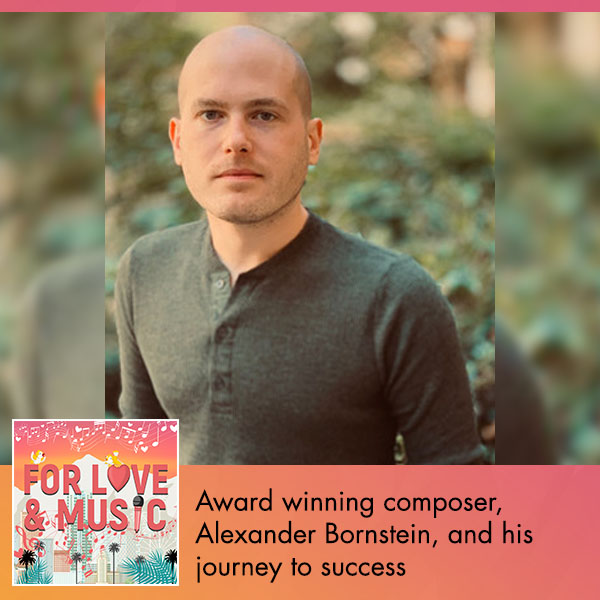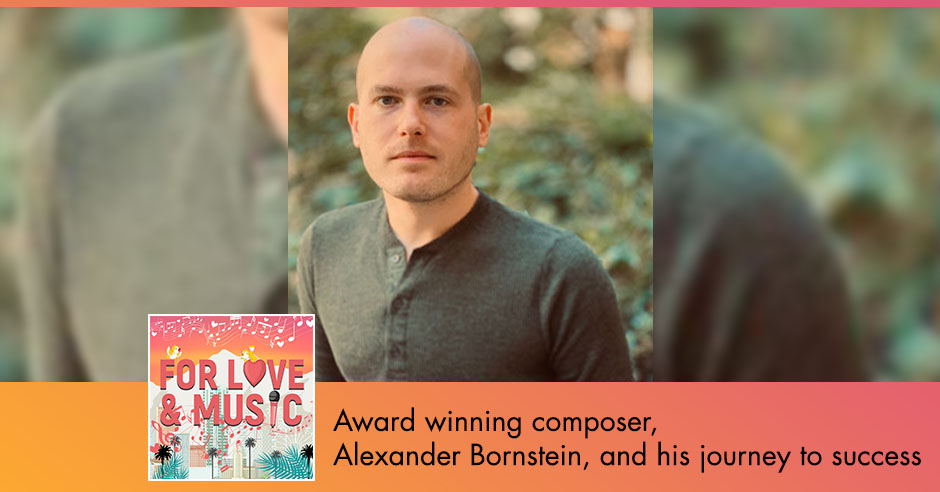
Tara Joseph sits down with award-winning LA based composer, Alexander Bornstein, to talk about his creative processes and projects. He takes us behind the scenes of scoring the upcoming Netflix Original Animated Series, ‘Transformers: War for Cybertron Trilogy – Siege,’ as well as his previous works with Ray Donovan, Doug Liman, and more. Pointing to the current COVID-19 pandemic we are all experiencing, Alexander then shares how he is adapting and adjusting in his work. Listen in on this interesting conversation to find out more about what it is like to be a film/TV composer in LA and in a time of quarantine.
—
Listen to the podcast here:
Award winning composer, Alexander Bornstein, and his journey to success
I’m hoping everyone is staying safe and healthy out there. Let’s get cracking and welcome to the show award-winning composer, Alexander Bornstein. Alexander, how are you?
I am good. Thanks. How about yourself?
I’m good, thanks. Where are you situated?
I’m based in Los Angeles.
Whereabout?
Near Marina Del Rey.
Have you been able to get out much or because of lockdown, you haven’t seen the sea for a few months?
My wife and I had done some scenic drives. We’re trying to adhere to the lockdowns as much as needed to stay safe and everything.
You’re not originally from LA, where are you from?
I grew up split between the outside of Philadelphia in Pennsylvania and then in Florida, but I was born here in Burbank. I’ve been all over the place.
We’re in living under different circumstances, but how’d you find life in LA? It’s the hub of the music industry and you’re a composer, film, and TV.
I like it. It’s almost a spectator sport. It’s a trash LA for the people that live here. I’ve been here since 2011. I’ve been very fortunate and lucky to get into a career here, develop a lot of great relationships, and take advantage of everything that the city has to offer. Things are a little bit different.
With LA, you do have to take advantage of the opportunities that you’re given and look for the ones that potentially are there as well. If you’re someone who can do that, you’ve got a big shot of making a success of things in this town.
You have to keep a very open mind, learn how to mentally take that step back, and see the forest and the trees. When you can do that, especially in a place like LA, you do learn to make the most of it.
Get into a career in Los Angeles, develop a lot of great relationships, and take advantage of everything the city offers. Click To TweetWhat I’m keen to chat about is you’ve got some huge achievements to your name already. Let’s chat about Transformers: War for Cybertron Trilogy. This particular season is called Siege. I’ve seen it. I haven’t watched much Transformers animation in the past or the live-action, but I was quite hooked. What brought me in, and I’m not saying this simply because I’m talking to you, but the music is brilliant, so congratulations there. How did you go about making the decisions for your musical choices for Transformers?
It’s been a bit of a longer form experience than I’m used to on a lot of projects.
We have to say that it’s Netflix’s baby.
It’s a Netflix original anime series. The discussion for the music started very early on when I was brought on board. The Showrunner F.J. DeSanto had a very clear idea that he wanted what you hear in the show is this fusion of electronics synthesizers with orchestra, but also an emphasis. The thing I wanted to do so that we didn’t sound like Daft Punk or a lot of the hybrid score that already exists is to add a layer of solo instruments on top. They get these moments to spotlight in terms of solo cello, solo wind instruments, and solo violin.
Ideally, this creates the palette that you hear in the show, which is very electronic and artificial sounding in that sense. With the solo textures, you get a little bit more personality because the individual players were bringing their style to it. There was a lot of back and forth, trying to figure out the best balance of all those elements. Once we figured that out, it became a very organic process of establishing themes and doing all of this even before I started scoring the actual series. Having that time was advantageous because it allowed us to make sure that we had our best foot going forward.
Where does your music end in the show, and where does the special effects sounds come in? Because there’s quite a lot of Sci-Fi kind of sounds within. When I was to it, I was like, “Is that you or not?”
The best gauge is whatever sounds are being motivated by on-screen action, that is something that the sound designers are handling, the recording mixer, and anything that seems it’s coming off-screen is me. I did a lot of sound processing in the music. Even taking the classic Transformer sound effect, which is this very mechanical ratchet sound, putting that into queues, chopping it up, creating rhythmic figures with it. Doing a lot of things with choir samples and processing them through different kinds of filters and EQ effects to create very distorted and not alien-sounding effects because it takes place on an alien planet. It was a bit of a gray area. It’s been interesting to hear the final mixes of these episodes because I’m seeing the end result of on-screen sound effects blending with some of the musical textures that I created.
The music that you created added another dimension to all of the extraordinary visual content. People definitely must watch the show because it appeals very much to adults as well as to youngsters. The original Transformers was in the ‘80s.
G1 started in 1984.
There are people who grew up obsessed with Transformers. My wife has grown up obsessed with Transformers. People are going to love what they see.
I hope so. Everyone involved is a Transformers fan in some capacity. We’re all bringing a lot of passion and excitement to it, but it’s a great approach to the story with these characters that everyone knows. People who aren’t familiar with Transformers could start with episode one and not miss a beat. There isn’t all this mythology that happened.
I felt that because I’m not someone who spent the past years following all the stories of the Transformers, but I found that engaging. The graphics are amazing.
We’ve been working on the show in isolation for so long now that it’s starting to trickle out and people are getting to see it. For you to say that is such a relief, so it’s exciting.
Looking and listening to some of your music on your website, it’s big and powerful. You built such big crescendos. You’ve worked on shows like Ray Donovan for Showtime Supernatural and CW. How do you go about creating and what’s your process? When you’re given a script, if that’s how it works for Ray Donovan, for example, which I love incidentally.
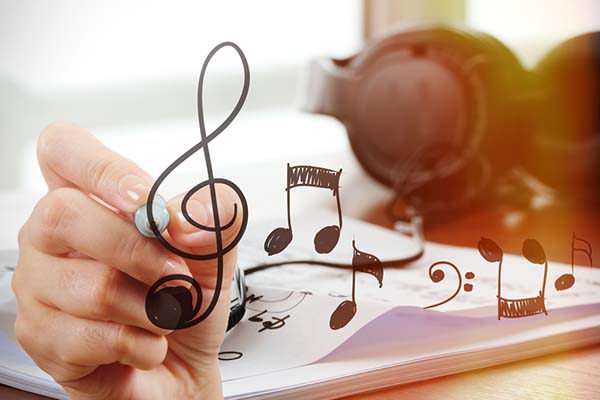
You get scripts sometimes. I did receive scripts on Transformers. I always say that there’s no such thing as too much information for me as a composer. The more visuals I see, the more I talk with people about the show and the more that we talk about the music. It all holistically helps the process. I’m coming in and watching their cut of the episode or the film. From there, I left to my own devices to figure out the rhythm and the beats. That’s where I started. I established the tempo of whatever the scene is. Are they talking fast? Are they talking slow? Are people being chased dramatically, what’s going on?
I start feeling out the queue that way in terms of tempo. From there, that helps me establish at least a baseline to start hearing things in my head. There’s a certain element of it. It’s almost difficult to explain in terms of the process because you are reacting to it. My undergraduate background was in jazz piano, and the experience of playing a jazz solo is not completely dissimilar from being a film score composer because you’re watching and reacting. When you’re playing in a jazz ensemble, you are reacting to the piece and performing your solo accordingly. Being a film composer is the same process where you’re watching the scene, participating almost as an audience member, and reacting musically to what’s going on. Where my process starts is trying to treat myself as a member of the audience.
Do you work from home or do you have a studio elsewhere?
I had been working from home since about 2018. Before that, I was based at a place called Sonic Fuel Studios in El Segundo, which is in Los Angeles but South of it. I was renting a room for a little while there. It was in a collective of composers because before that, I had been an assistant to a composer there for a few years.
During the lockdown, I presume you’ve readapted and been working from home again.
I was fortunate that I’ve been home since September of 2018 when everybody started working from home. The novelty wore off a long time ago because I had been used to it at that point. It was a relatively easy adjustment to make because most musicians in Los Angeles had the ability to record remotely. I lost the ability to have in-person recording sessions, which was disappointing because you do get a lot out of interacting with clients in real-time. Everybody had the infrastructure to adjust and I send materials accordingly. I had a big filing system on my Dropbox. It was like, “This is going out for cello. This is going out for this.” It was an adjustment externally that we’re in a good flow.
I’m also excited that you’ve worked with the amazing director, Doug Liman. Films like The Bourne Identity, Mr. and Mrs. Smith, Fair Game, and you worked with him on the show Invisible.
Invisible was a production for Samsung Virtual Reality. That was my old boss and me, we co-composed the score for this. It was one of the first, if not the first, narrative virtual reality series that Liman was executive producing. It was a unique experience to be working in that realm because virtual reality is cutting-edge technology. People are still trying to experiment with lots of interesting ways to tell stories with it.
What was it like working with him because he’s such a genius?
It was fantastic. It was a similar process to Transformers. We wrote some themes. We got a sound palette established for the show. It was a matter of sending things out, getting feedback. There was one instance where we were having trouble with this one sequence and his feedback was very interesting in terms of how he framed and what he wanted the music to be doing. It was one of those things. It was like a big light bulb moment because you’re like, “I’d never think to score the scene the way that you’re suggesting.” With that one fix, as soon as we landed on what he wanted, the whole dynamic of the scene change. That’s going in the tool shed because that’s a great instinct I wouldn’t have gravitated towards. The thing I love about the collaborative aspect of film composing is that those instincts, the way they develop.
He’s such a prolific director. I’m sure you’ll be hearing from him again soon.
Fingers crossed. You don’t know.
Are there other directors that you would love to work with?
There’s so much content being made now. There isn’t much out there that I wouldn’t want to be working on. It’s exciting that there’s so much being done in television and filmmaking. If I had to whittle it down, it would be amazing to work with Vince Gilligan, who created Breaking Bad. I thought the score that Dave Porter did was something else and impressive, especially how it develops through the course of the show. That would be exciting. It would be neat to work. I thought the Mandalorian was an interesting TV show. It’s a difficult thing to be conservative and whittle it down to a handful of people. Off the top of my head, those are two examples.
Virtual reality is cutting-edge technology. People are still trying to experiment with lots of interesting ways to tell stories about it. Click To TweetAs you may have realized, my show is called For Love And Music, and those are the two reasons that I moved to LA. I like to ask everyone how love and music have ever been intertwined in your life. For example, has love ever helped you make an unexpected decision in your career? It doesn’t have to be, yes. It can be no.
I hadn’t thought about it before. I don’t think so.
Is there a song that resonates romantically for you? Something that is like, “Oh my God, yes. That’s our song.”
It’s a lot of stuff by Jerry Goldsmith. He was a composer I grew up listening to and always felt the odd duck because a lot of people that were in the film scores tended to gravitate more towards like John Williams. They were contemporaries and some of his love themes were very evocative for me is feeling that deep movement that you have when you’ve listened to music that speaks to you. His love theme from the First Night, Forever Young, Under Fire, these lush romantic themes. Those spoke to me a lot and I also am a big fan of a Japanese composer, Joe Hisaishi. His theme for the two main characters in Princess Mononoke, to me it had a romantic quality that stirs a lot of those kinds of feelings of love and affection in me.
I always say the same thing. People must’ve heard me say this so many times, but I love Unfinished Sympathy by Massive Attack. That’s one of my favorite songs of all time. I love Morcheeba. I don’t know if you know Morcheeba but they had an album out in the early 2000s that was killer for me. What do you like to do in your spare time when you’re not composing?
It’s something I’ve had to grapple with a lot since the lockdown started with the Coronavirus. For the last few years, I have been studying Japanese. That’s been a nice productive hobby to keep going back to because it’s an unending learning experience. I started studying the cello during the lockdown.
How’s that going?
It could be going better.
Have you found that your creative process through lockdown has been different to how it would normally be? You have been in forced isolation rather than chosen isolation.
It’s been a bit of a process to figure out how to best attack these creative problems because I can’t go out anymore. This is my feeling. Sometimes it feels very frivolous to be creative. It’s been a process grappling with being creative during such a tumultuous time in the world. That’s been something that I’ve had to think about, which I would never have expected, but it’s still something.
Do you think it’s influenced the kind of news that you’re creating, the turmoil that you feel around you?
At least in terms of where I feel my mind going when I’m writing. The next chapter of the Transformers series is very introspective and a lot more dramatic than the first chapter. It’s coincidental, but the decisions that I’m making musically do seem to be aided by the fact that this next chapter of the show is a lot darker and more intense. I seem to be going that way to musically even independent of the show.
Were you a musical child? Do you play lots of different instruments? I know you’re learning the cello but take us back to the beginning.
I’ve had a roundabout arrival to becoming a composer. I’ve been listening to film scores since I was about 6 or 7 years old. The music from Back To The Future and the film Robocop. For whatever reason, I heard the music and I didn’t hear anything else in those films. I grew up listening to this very niche kind of music. Aside from a couple of years of piano, I didn’t start studying music until I was about twenty and I was in college. I’d started out wanting to be a filmmaker. In the back of my mind, I’d said, “If I could do it all over again, I would be a composer.” I wasn’t a musical prodigy.
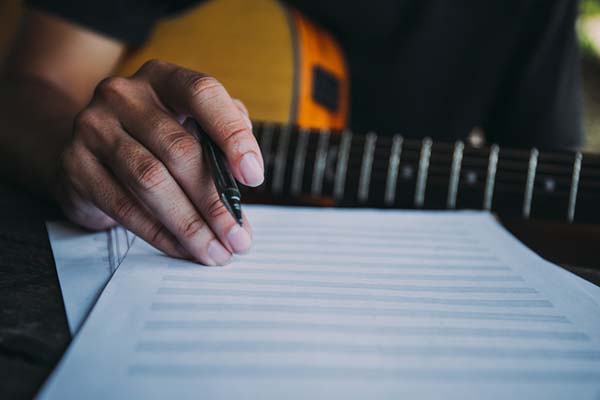
I didn’t start studying this as soon as I could read. That’s maybe in another life. In college, I was finding myself not enjoying or not finding fulfillment from writing and trying to make films. Concurrently, I was studying music on my own. Based on the very fragile foundational stuff that I had from those couple of years of piano lessons, but because I was in college, I could enroll in a couple of music courses and be like, “Let me take music theory for fun.” It’ll help me understand the film music that I’m listening to and get a better understanding of it.
What happened is that I started taking one class. It became two and then four, and before I knew it, I was taking all the music courses and I wasn’t falling behind. I was keeping up with the studies and I was studying with a composer at that point. Before I realized that I was pursuing music as a career, I was lucky to be where I was in school at that time and meet these professors who didn’t tell me to mind my own business and let the musicians be the ones who get to study music. I went to grad school in New York for film scoring. From there, I was able to start making some professional contacts, and years later, here I am.
What does the future hold for Alexander Bornstein?
I wish I knew.
What would you like? What would your dreams be over the next 5 to 10 years?
I would love to see this series come out, people respond to it, enjoy it, and have that lead to more opportunities to keep composing music for film and TV shows. What that looks specifically, I don’t know. I want to keep an open mind about it as possible as things are changing. For me, over the next 5 to 10 years, if I can keep paying the bills by writing music, I’ll be content.
That sounds good. That’s what we want to do. Pay the bills doing something we love doing. You have been very much embroiled with animation, how have you found the process working on Transformers as an animated series versus working on live-action?
With live-action, you tend to have a better idea of what the whole finished product is going to look like. Some special effects that are missing or some this or that needs to be tweaked. With animation, you are starting from a blank slate, especially before the animation is even done. I wrote the three principle themes for Transformers, having only seen about ten seconds of finale animation. They did present you with some storyboards and animation.
That’s quite something to be able to do that with not seeing it.
The discussions I had with F.J. were helpful and helping focus in on those things. It was a good balance of being given enough information to start coming up with ideas, but also not being so bombarded that I felt I didn’t know where to start. Even when I started scoring the series, I would get their unfinished animations. The textures aren’t there. There are no lighting effects. It looks very unfinished, but the timings are enough that I can write the music. That’s a very different experience from a TV show where you’re watching the finished episode and reacting to it. Here, I had to use my imagination a little bit more.
How long did it take them to create the visuals? They’re so good.
They gave me the raw animatic for episode one. I want to say August or September of 2019. In the finished version of that animatic came three months later. I’d say it’s about several months for them to take the timed-out animatic and then add all the layers that you see in the final show. The smoke, the light, the details, and all the characters.
It’s an incredibly impressive animated series. I would encourage everyone to watch it. Alexander, I want to say it’s been such a joy to have you on the show. You’re incredibly talented. I’m looking forward to seeing what comes next for you because you’ve already achieved so much. Thank you for being a guest on the show.
Thank you for having me.
I want to say thank you to all of our audience and you will be hearing from me again very soon. Stay safe, everyone.
Important Links:
About Alexander Bornstein
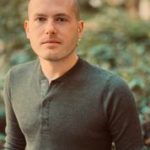 Alexander Bornstein is an award-winning composer currently based in Los Angeles. His music can be currently heard in television, independent films, feature films, web series, and documentaries. Alexander has also been at the forefront of new multimedia platforms such as composing music for Doug Liman’s ‘Invisible’, one of the earliest series produced for virtual reality.
Alexander Bornstein is an award-winning composer currently based in Los Angeles. His music can be currently heard in television, independent films, feature films, web series, and documentaries. Alexander has also been at the forefront of new multimedia platforms such as composing music for Doug Liman’s ‘Invisible’, one of the earliest series produced for virtual reality.
Recent works include ‘First to the Moon: The Journey of Apollo 8’ and additional music for numerous TV series including ‘The Boys’ and ‘Lost in Space’. He is currently scoring the upcoming Netflix Original Anime Series ‘Transformers War for Cybertron Trilogy: Siege’. Over the years, Alexander’s work has brought him through major music studios including Abbey Road Studios, Remote Control Productions and Sonic Fuel Studios
Love the show? Subscribe, rate, review, and share!
Join the For Love and Music Community today:

